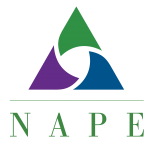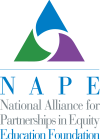The National Alliance for Partnerships in Equity (NAPE) is accepting proposals for its annual National Summit for Educational Equity.
At the 2025 Summit, NAPE will provide a space for the sharing of wisdom by practitioners, researchers, and, most importantly, the students and families we serve. When we center, elevate, and authentically integrate student and family voice, we strengthen our understanding of the historical context that reflects the often erased histories and lived realities of those most marginalized by our current systems and structures.
The Summit brings together administrators, teachers/instructors, counselors, and other educational and workforce leaders to focus on the individual, institutional, and systems-level work that is required to identify and remove barriers to access and opportunity; foster equitable learning environments; and support pathways to thriving-wage, in-demand careers.
The Summit offers learning and community-building opportunities through workshops, interactive learning sessions, and networking events to strengthen our equity lens and build our capacity to advocate and organize for change within our communities. We know that equity isn’t a destination but an unwavering commitment to a journey of learning and growth.
To address these realities in an authentic and thoughtful way, NAPE is inviting workshops that align to any of the following six strands:
Strands
Promoting STEM & CTE
Ensuring all students have access to high-quality CTE/STEM education is essential to achieving economic justice for marginalized communities. This strand will focus on the ways in which students develop their perceptions of careers, their exposure to CTE/STEM programs and careers, and the marketing and promotional activities we can use to inform students and families about the opportunities available to them.
Topics may include: Innovative policies, practices, and programs that are effective in increasing access and equity in CTE and STEM for underrepresented groups, innovative career exploration programs, summer bridge programs for underrepresented students in STEM, and topics addressing recruitment and promotion within CTE/STEM programs.
Equitable Learning Environments
Creating equitable learning environments requires us to move beyond concepts such as diversity and inclusion and towards equity and justice. Equitable learning environments allow members of marginalized groups to experience true belonging and co-authorship of their education – and where every student can thrive. This includes the centering of all student and learner voices.
This strand will focus on effective strategies, mechanisms, and approaches that educators can use to strengthen their responsive teaching skills, such as implementing curriculum and pedagogical practices that utilize students’ cultural backgrounds and community knowledge.
Topics may include: culturally responsive teaching, anti-racist teaching and curriculum, critical pedagogy, transformative justice, innovative work-based learning practices, and practices to elevate learner voice.
Supporting Special Population Student Success
This strand is for those seeking to better understand how to access the funds and resources available via the
Perkins V legislation and federal programs like TANF (Temporary Assistance for Needy Families). This strand is best for practitioners and coordinators seeking to deepen their equity knowledge while enhancing the skills necessary to be effective in disseminating funds.
Topics may include: best practices for utilizing Perkins V funding, opportunities for braiding resources, inclusion and understanding of Perkins V special populations, effective solutions for disrupting the poverty cycle, resisting paternalism in favor of care, growing and diversifying the teacher pipeline, and providing wrap-around services.
CLNA and Methods of Administration (MOA)
The purpose of the CLNA and Methods of Administration program is to ensure that all students, regardless of race, color, national origin, sex, or disability, have equal access to high-quality career and technical education programs. This strand is best for MOA coordinators and state leaders who wish to thoughtfully embrace equity in their application of the guidelines.
Public Policy
Subject matter may address federal initiatives focusing on closing the skills gap; federal funding and appropriations for secondary and post-secondary programs, career and technical education (CTE), recognized Apprenticeship programs, STEM, AI and Automation and the Future of Work; equity policies and strategies pertaining to gender, race, ethnicity, disability, underrepresented populations, veterans, re-entry and ESL; Legislative focus may include (but not limited to) HEA, WIOA, Title IX, Dual Enrollment, Equal Pay, and civil rights.
The Future of Workforce: AI, STEM, and CTE
Looking toward the future means preparing our workforce for pathways that lead to building sustainable change. This innovative strand seeks to explore what is on the horizon for tech and industry to uncover the opportunities for access.
Audience
This conference is designed for educators, workforce development professionals, and advocates dedicated to removing barriers to equitable opportunity in education and the workforce. Proposals should be drafted to address the following audiences: secondary/postsecondary educators, career and technical education and workforce development professionals, researchers, administrators, counselors, data specialists, business representatives, and/or nonprofit staff.
To Apply
All submissions must include the following information. Incomplete submissions will not be considered. The submission deadline is November 15, 2024. Notification letters will be sent to the primary presenter via email.
PRESENTER INFORMATION
Name, job title, organization, address, city, state, zip, phone, email, brief biography, headshot and social media links.
DESCRIPTION OF PRESENTATION
- Title of Presentation
- Conference strand
- Type of presentation: research/evaluation, tools, implementation/practice, outreach, other
- Population(s) that your presentation will focus on: Single Parents, Individuals with Disabilities, Older Workers, Out-of-work Individuals, Youth, Individuals Pursuing Nontraditional Careers, English Learners, Underrepresented Groups in STEM, Economically Disadvantaged, Veterans or Military Personnel, Adult Learners, Specific Ethnic/Racial Population, Homeless Individuals, Other.
- Intended audience for your presentation and your expectations about their level of experience with your topic.
- Abstract that describes your presentation. The abstract will be used for the program guide. NAPE reserves the right to edit the abstract.
- Full description of the proposed presentation. Because successful presenters will meet the criteria noted in the ‘proposal tips and guidelines’ section, please include explanations to each in your description.
Availability
Identify the day(s) you are available to present (Tuesday, March 18, 2025, Wednesday (policy only), March 19, 2025 and/or Thursday, March 20, 2025).
PROPOSAL TIPS AND GUIDELINES
Workshops are 60 minutes in length. Successful presenters:
- have firsthand experience with their topic and understand their audience;
- provide practical-application-focused information;
- engage participants in an activity or hands-on learning;
- provide useful handouts for workshop attendees;
- present effective strategies focused on one or more special populations or other underrepresented groups; and
- align with the theme of the conference.
AUDIOVISUAL NEEDS AND HANDOUTS
Please indicate your audiovisual needs via the call for proposals form. NAPE is attempting to continue an “unplugged” conference environment with some sessions that are tech-enabled and others that focus on connection. If you are presenting utilizing AV, an electronic copy of presentations must be uploaded to a digital folder prior to the conference.
REGISTRATION INFORMATION
Presenters must register for the Summit and must cover all expenses associated with travel to and from the conference, lodging, and meals (other than those provided during the conference). The hotel room rate for the Summit is $295 + tax. Presenters who choose to attend the conference only for their session will not be required to pay a registration fee.



